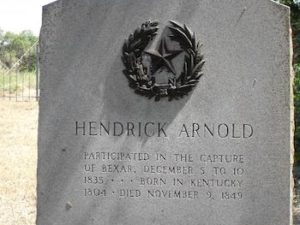
Hendrick Arnold Gravestone
This date, 1804, is celebrated as the birth date of Hendrick Arnold, a Black military scout, guide, and spy during the Texas Revolution.
Hendrick Arnold emigrated from Mississippi or Kentucky to Texas with his parents, Daniel Arnold, a white man, and Rachel, who was black, in the winter of 1826. The family settled in Stephen F. Austin's colony on the Brazos River. Hendrick is referred to as a Negro, although his brother Holly was regarded as white; both were considered free. In July or August of 1827, Hendrick and a slave named Dolly had a daughter, Harriet. Hendrick held Harriet as a slave.
By the fall of 1835, Arnold had settled in San Antonio and married Martina (María), a stepdaughter of Erastus (Deaf) Smith. Arnold had a second daughter, Juanita, Martina's child. While Arnold and Smith were hunting buffalo in the Little River country north of the site of present Austin, Mexican forces under Gen. Martín Perfecto de Cos occupied San Antonio. On their trip home, Arnold and Smith visited Stephen F. Austin's encampment at Salado Creek.
Arnold, and soon thereafter Smith, served as guides to the Texans. In October, Arnold took part in the battle of Concepción. When Edward Burleson, who had replaced Austin as commander, called a council of officers on December 3, 1835, the council decided to postpone an attack on San Antonio. When Benjamin R. Milam called for an attack, it was called the Siege of Bexar. Arnold served as the guide for Milam's division.
Francis W. Johnson, leader of the other division, wrote the official report of the battle for himself and Milam, who was killed during the siege. Johnson acknowledged the bravery of all the Texan forces and cited Arnold specifically for his "important service." On January 3, 1836, Arnold moved to San Felipe de Austin with his family and Erastus Smith.
He successfully petitioned the General Council of the provisional government of Texas for relief for their families and noted Smith's service for Texas and his wounds suffered in battle. Arnold continued to support the revolution and served in Smith's spy company in the battle of San Jacinto. After the revolution, Arnold compensated for his service with land a few miles northwest of the site of present Bandera.
Arnold secured adjacent land for his grandmother, Catherine Arnold, his father, Daniel, and his brother Holly. Hendrick Arnold lived on the Medina River and operated a gristmill in San Antonio. In 1846, Arnold arranged an indentured servant Headright Property contract between his daughter Harriet and James Newcomb. Newcomb agreed to pay $750 for her services and then free her after five years. Both Arnold and Newcomb died of cholera before the expiration of the contract.
On December 29, 1849, Newcomb's administrator, George M. Martin, petitioned the Texas House of Representatives to permit Harriet to remain in the state as a free woman of color. The resolution passed the House; however, Arnold's family made several attempts to regain Harriet from Martin. Martina Arnold took the matter to court, sued Martin for $2,000 plus the $750 due on the indentured-servant contract, and requested that Harriet be returned to her. The case's outcome was cloudy; however, Harriet was allowed to remain in the state as a free woman. Hendrick Arnold died in the cholera epidemic in Bexar County in 1849 and was buried on the banks of the Medina River. A portion of the mill stood in 1990 near Mission San Juan.
BIBLIOGRAPHY: The Afro-American Texans (San Antonio: University of Texas Institute of Texan Cultures, 1975). John H. Jenkins, ed., The Papers of the Texas Revolution, 1835-1836 (10 vols., Austin: Presidial Press, 1973). Harold Schoen, "The Free Negro in the Republic of Texas," Southwestern Historical Quarterly 39-41 (April 1936-July 1937).